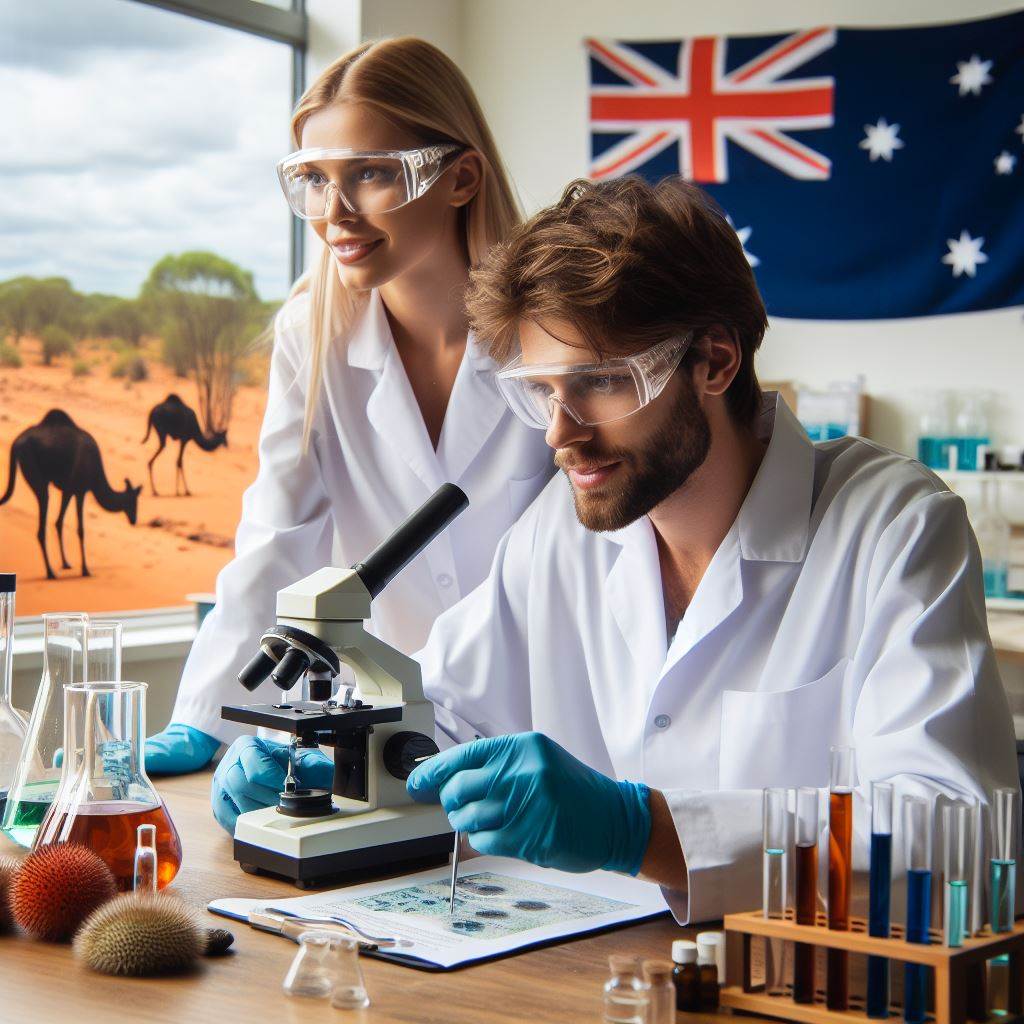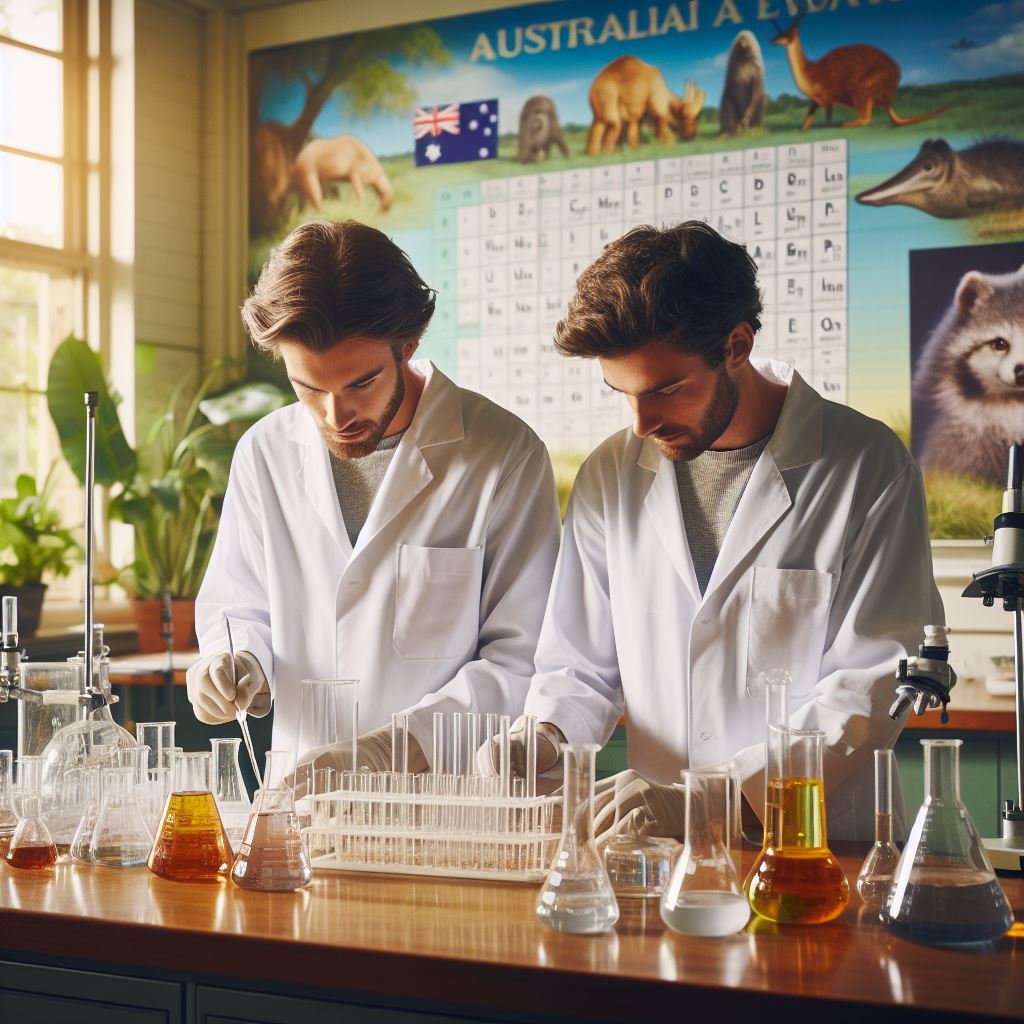Introduction
Essential skills are crucial for Australian scientists in order to thrive in their field. This blog post aims to provide an overview of these skills and emphasize their significance. Let’s dive in!
In the fast-paced world of scientific research, having the necessary skills is essential for Australian scientists to excel. These skills go beyond just academic knowledge, highlighting the need for a well-rounded set of abilities to succeed in this competitive field.
The aim of this blog post is to shed light on the importance of essential skills for Australian scientists and discuss how they can be developed and honed.
By focusing on active voice, we aim to engage readers and convey information in a dynamic and compelling manner.
So, what exactly are these essential skills? They encompass a wide range of abilities, including effective communication, critical thinking, problem-solving, teamwork, and adaptability.
These skills not only facilitate collaboration with colleagues but also enable scientists to effectively convey their ideas and research findings to a broader audience.
In the following sections, we will explore each of these skills in detail, providing practical tips and advice on how scientists can enhance their proficiency in each area.
By developing these skills, Australian scientists can enhance their career prospects, contribute meaningfully to their field, and make a positive impact on society.
In essence, essential skills are the backbone of success for Australian scientists.
By cultivating these skills, scientists can navigate the complex and ever-evolving field of research and make valuable contributions to their respective disciplines. Stay tuned for the next sections, where we delve into the specifics of each skill.
Communication Skills
Effective written and verbal communication skills are of utmost importance for Australian scientists. Here are some essential skills they need to master:
Clear and Concise Writing
- Scientists must be able to convey complex ideas and research findings in a clear and concise manner.
- Using jargon-free language and organizing information logically improves understanding and readability.
- Well-written scientific papers and reports ensure that the intended audience can easily comprehend the findings.
- Concise writing also helps in effective collaboration with other scientists and researchers.
Public Speaking and Presentation Skills
- Scientists should possess the ability to deliver engaging presentations about their research.
- Developing effective slides with concise information and supporting visuals enhances audience engagement.
- Being confident and articulate while presenting helps in effectively conveying scientific concepts.
- Engaging public speaking skills are crucial for sharing research at conferences and seminars.
Active Listening and Collaboration
Scientists need to actively listen and collaborate with their peers to foster scientific progress:
- Listening attentively to colleagues’ ideas and perspectives promotes better understanding and integration of knowledge.
- Collaborating with other scientists from different backgrounds promotes interdisciplinary research.
- Active listening and collaboration lead to the generation of innovative ideas and problem-solving.
- Networking and collaboration facilitate knowledge exchange and learning from experts in various fields.
“Empowering Australian Scientists through Effective Communication”
Mastering effective communication skills is pivotal for Australian scientists to succeed and make significant contributions to their respective fields.
With clear and concise writing, they can disseminate valuable research findings to a wide audience, including policymakers and the general public.
Moreover, honing public speaking and presentation skills enables scientists to effectively communicate their research at different forums and engage with diverse audiences.
Whether it’s presenting at conferences or pitching ideas to potential funders, impactful communication helps in garnering support and collaborations.
“Enhancing Scientific Impact: The Role of Communication and Collaboration”
Additionally, active listening and collaboration are essential for fostering a cooperative scientific community.
By actively listening to their colleagues, scientists can gain new insights and perspectives, facilitating further research advancements. Collaborative efforts across disciplines also lead to innovative solutions for complex challenges.
In a nutshell, effective communication skills play a crucial role in the success of Australian scientists. Clear and concise writing, along with strong public speaking and presentation abilities, allows scientists to share their knowledge effectively.
Active listening and collaboration foster a collaborative scientific environment, facilitating interdisciplinary research and innovation.
By honing these essential skills, Aussie scientists can drive scientific progress and contribute meaningfully to global knowledge.
Critical Thinking and Problem-Solving Skills
In order to thrive as a scientist in Australia, it is crucial to possess a range of essential skills. One such skill is critical thinking and problem-solving abilities.
These skills are vital for analyzing complex data and information, as well as applying logical reasoning and the scientific method.
One of the primary aspects of critical thinking for scientists is the ability to analyze complex data and information.
Scientists often encounter vast amounts of data and information, and being able to effectively analyze and interpret this is essential for drawing accurate conclusions. This requires the ability to identify trends, patterns, and correlations within the data.
Applying logical reasoning and scientific method
Additionally, scientists need to apply logical reasoning and the scientific method to their work.
This involves developing hypotheses, designing experiments, collecting and analyzing data, and drawing conclusions based on evidence. By using logical reasoning, scientists can ensure that their work is rigorous and reliable.
Your Personalized Career Strategy
Unlock your potential with tailored career consulting. Get clear, actionable steps designed for your success. Start now!
Get StartedCreativity for innovative approaches to scientific challenges
Furthermore, creativity is essential for scientists when faced with scientific challenges.
The ability to think outside the box and to come up with innovative approaches is crucial for advancing scientific knowledge and solving complex problems. Creativity allows scientists to discover new possibilities and explore uncharted territories.
Lastly, resourcefulness is an important skill for scientists as they often encounter unexpected problems.
Being resourceful means having the ability to adapt to changing circumstances and to find solutions when faced with unforeseen challenges.
This skill allows scientists to overcome obstacles and continue their research even in the face of adversity.
In general, critical thinking and problem-solving skills are essential for scientists in Australia.
The ability to analyze complex data and information, apply logical reasoning and the scientific method, exhibit creativity, and demonstrate resourcefulness are all crucial for success in the field of science.
By honing these skills, Australian scientists can make significant contributions to scientific knowledge and address the challenges that lie ahead.
Read: The Future of Green Chemistry in Australia
Teamwork and Collaboration
Collaboration within research teams and across disciplines enhances the outcomes of scientific endeavors.
Effective communication and cooperation with colleagues are fundamental in achieving shared goals.
Sharing knowledge, ideas, and research findings foster innovation and progress in scientific fields.
Developing interpersonal skills is crucial for building strong professional relationships and promoting effective teamwork.
Resolving conflicts in a constructive manner is essential for maintaining a harmonious and productive research environment.
Collaboration within research teams enables scientists to combine their expertise and diverse perspectives.
Working across disciplines allows scientists to explore complex problems from various angles, leading to innovative solutions.
Effective communication and cooperation with colleagues
Effective communication ensures that team members are on the same page and avoid misunderstandings.
Cooperation with colleagues involves actively listening, respecting different viewpoints, and embracing diversity.
Sharing knowledge, ideas, and research findings
Sharing knowledge empowers others, contributes to the collective intelligence, and advances scientific understanding.
Stand Out with a Resume That Gets Results
Your career is worth more than a generic template. Let us craft a resume and cover letter that showcase your unique strengths and help you secure that dream job.
Get HiredExchange of ideas sparks creativity, invites constructive criticism, and fosters scientific growth.
Collaborative research findings have a greater impact, as they are built upon multiple perspectives and diverse expertise.
Developing interpersonal skills and resolving conflicts
Building interpersonal skills involves cultivating empathy, active listening, and clear and respectful communication.
Resolving conflicts in a constructive manner strengthens relationships and fosters a positive research environment.
Conflict resolution techniques, such as mediation and compromise, allow for effective problem-solving and collaboration.
Developing emotional intelligence helps scientists navigate challenging situations and maintain positive relationships.
Teamwork and collaboration are essential in tackling complex scientific challenges that require diverse expertise.
Collaborative projects enable scientists to pool resources, share equipment, and conduct larger-scale experiments.
Fostering Collaboration: A Catalyst for Scientific Advancement
Interdisciplinary collaborations allow for the integration of knowledge from different fields and the emergence of new ideas.
Collaboration enhances efficiency, as team members can divide tasks, share workload, and leverage each other’s strengths.
Collaborating with colleagues from diverse backgrounds exposes scientists to different perspectives and approaches.
Teamwork fosters a supportive and motivating environment, where scientists can learn from each other’s successes and failures.
Collaboration stimulates innovation, as it encourages scientists to think outside their own expertise and explore new avenues.
Effective teamwork and collaboration are not only beneficial for scientific progress but also for personal and professional growth.
Transform Your LinkedIn for Maximum Impact
Elevate your professional brand with a LinkedIn profile that attracts recruiters, showcases your expertise, and maximizes opportunities. Stand out in your industry with a profile built for success.
Boost ProfileGenerally, teamwork and collaboration are crucial for the success of Australian scientists. Whether it is within research teams or across disciplines, these skills facilitate effective communication, knowledge sharing, and conflict resolution.
By embracing collaboration, scientists can harness diverse perspectives, drive innovation, and create a positive and productive research environment.
Read: Australian Women in Chemistry: Trailblazers
Technical Skills
When it comes to being an Australian scientist, there are several essential technical skills that are crucial for success in the field.
These skills not only help scientists carry out their research effectively but also enable them to stay updated with the latest advancements. Let’s explore some of these skills:
Proficiency in the use of scientific equipment and tools
- Ability to operate various scientific instruments and tools is a fundamental skill for scientists.
- Knowledge of how to handle and calibrate equipment ensures accurate data collection and analysis.
- Proficiency in using microscopy, spectrometry, chromatography, and other equipment is essential for different research areas.
Expertise in relevant software and programming languages
- Scientific research often involves data analysis and modeling, requiring knowledge of software and programming languages.
- Proficiency in programs like MATLAB, Python, or R allows scientists to process and interpret complex data.
- Skills in computer-aided design (CAD) software are necessary for designing and simulating experiments.
Laboratory techniques and safety protocols
- Australian scientists need to be well-versed in various laboratory techniques and safety protocols.
- Knowledge of proper handling and disposal of hazardous materials ensures a safe working environment.
- Skills in aseptic techniques, titration, filtration, and sample preparation are vital for accurate experimental results.
Continuous learning to stay updated with advancements
- The world of science is constantly evolving, so scientists must commit to lifelong learning.
- Staying updated with the latest advancements enables scientists to contribute to their field effectively.
- Attending conferences, workshops, and professional development programs helps scientists stay ahead.
Therefore, technical skills play a crucial role in the success of Australian scientists.
Proficiency in scientific equipment and tools, expertise in software and programming languages, knowledge of laboratory techniques, and a commitment to continuous learning are all essential for scientific excellence.
By honing these skills, scientists can contribute meaningfully to their respective fields and drive advancements in Australian research.
Read: Must-Attend Chemistry Conferences in Aus

Time Management and Organization
Effective time management and organization skills are crucial for scientists to excel in their work. By prioritizing tasks and meeting deadlines, scientists can ensure the successful completion of their projects and experiments.
Additionally, efficient management of projects and experiments is essential for ensuring that research progresses smoothly. Here are some key skills that Aussie scientists should develop in order to excel in time management and organization:
- Prioritizing tasks and meeting deadlines: Scientists must be able to recognize which tasks are most important and allocate their time and resources accordingly. By setting realistic deadlines and tracking progress, they can ensure that projects move forward smoothly.
- Efficiently managing projects and experiments: Scientists need to plan and organize their projects and experiments effectively. This involves breaking down complex tasks into smaller, manageable ones and allocating resources efficiently to ensure timely completion.
- Planning and organizing data and research materials: Properly organizing data and research materials is crucial for scientists. They should develop systems for accurate record-keeping, data management, and easy retrieval of information. This enables better analysis and collaboration with colleagues.
- Developing strategies to avoid burnout and maintain work-life balance: Scientists often face demanding workloads, which can lead to burnout. It is important for scientists to prioritize self-care and establish a healthy work-life balance. This may involve setting boundaries, taking breaks, and seeking support from mentors and colleagues.
Effective time management and organization allows scientists to maximize their productivity and ensure the quality of their work.
By implementing strategies such as the following, scientists can enhance their time management skills
- Creating a to-do list: Scientists should start their day by creating a to-do list, outlining the tasks they aim to accomplish. This helps maintain focus and provides a clear roadmap for the day.
- Breaking down tasks: Large tasks can be overwhelming, so scientists should break them down into smaller, more manageable steps. This makes it easier to stay motivated and track progress.
- Setting deadlines: Scientists should set realistic deadlines for themselves and adhere to them. This helps maintain accountability and ensures that projects are completed in a timely manner.
- Utilizing technology: Scientists can take advantage of various tools and software that enhance organization and time management. These include project management software, calendar apps, and note-taking apps.
- Minimizing distractions: To maintain focus, scientists should limit distractions in their work environment. This may involve turning off notifications, setting specific work hours, or finding a quiet space for uninterrupted work.
In short, strong time management and organization skills are essential for Aussie scientists to excel in their work.
By prioritizing tasks, efficiently managing projects, organizing data and research materials, and maintaining work-life balance, scientists can increase their productivity and ensure the successful completion of their research endeavors.
Developing these skills, along with implementing strategies such as creating to-do lists, breaking down tasks, setting deadlines, utilizing technology, and minimizing distractions, will greatly contribute to a scientist’s success.
Read: Innovative Chemistry Startups in Australia
Adaptability and Resilience
Adapting to the ever-changing scientific landscape and embracing new technologies is paramount for Aussie scientists to stay relevant and competitive.
Being flexible and resilient is essential to overcome setbacks and failures that are inevitable in scientific research.
Challenging situations often arise, and maintaining motivation and perseverance is crucial for scientists to continue on their path.
Continuous learning and professional development are fundamental in keeping up with advancements in scientific knowledge and techniques.
Ability to Adapt to Changing Scientific Landscape and New Technologies
In the rapidly evolving field of science, Aussie scientists must possess the ability to adapt to constant changes.
Scientists need to be open to embracing new technologies that can revolutionize research methods and accelerate scientific discoveries.
Adaptive scientists can quickly learn and understand the intricacies of new scientific tools, enabling them to keep pace with advancements.
By staying up-to-date with the latest developments, scientists can ensure the efficiency and effectiveness of their work.
Flexibility to Handle Setbacks and Failures
Setbacks and failures are inevitable in scientific research, but Aussie scientists must possess the resilience to bounce back.
Flexibility allows scientists to adapt their methodologies or approaches when experiments don’t yield the desired results.
Instead of becoming discouraged, resilient scientists view setbacks as learning opportunities and adjust their strategies accordingly.
Handling failures with grace and learning from them is a crucial skill that all successful scientists develop over time.
Maintaining Motivation and Perseverance in Challenging Situations
In the face of challenges and obstacles, maintaining motivation and perseverance is key for Aussie scientists.
Scientists encounter complex problems, rigorous experiments, and intense competition, which can be demotivating and mentally exhausting.
However, scientists with high levels of motivation and perseverance persist and push forward even when the going gets tough.
These individuals are more likely to find innovative solutions and achieve significant breakthroughs in their research.
Continual Learning and Professional Development
Aussie scientists understand the importance of never-ending learning and actively pursue professional development opportunities.
They engage in ongoing education, attend workshops, conferences, and seminars to expand their knowledge and skills.
By continuously learning, scientists can broaden their scope of expertise and stay updated with the latest scientific advancements.
Professional development enhances scientists’ ability to conduct high-quality research and contribute to the scientific community effectively.
In review, adaptability and resilience are essential skills for Aussie scientists in a rapidly evolving scientific landscape.
They enable scientists to embrace new technologies, overcome setbacks, maintain motivation, and continue learning and developing professionally.
By honing these skills, Aussie scientists can thrive and make significant contributions to the advancement of scientific knowledge and innovation.
Learn More: Fieldwork Tales: Aussie Enviro Scientists Share
Ethical and Professional Conduct
Adhering to ethical guidelines and research integrity is crucial in maintaining the integrity of the scientific community.
By ensuring that scientific studies are conducted in an ethical manner, scientists can be confident in the validity and reliability of their findings.
Maintaining confidentiality and data privacy
Maintaining confidentiality and data privacy is another essential aspect of ethical conduct for scientists.
This includes respecting the privacy rights of participants and ensuring that their personal information is securely stored and not disclosed without their consent.
Promoting diversity, equity, and inclusion in the scientific community
Promoting diversity, equity, and inclusion in the scientific community is not just a moral imperative but also a necessary step towards fostering innovation and excellence.
Scientists should actively work towards creating an environment that welcomes and supports individuals from all backgrounds.
Upholding professionalism and ethical behavior in all interactions
Upholding professionalism and ethical behavior is vital in all interactions within the scientific community.
This includes treating colleagues with respect, acknowledging their contributions, and giving credit where it is due. It also means avoiding plagiarism and properly citing the work of others.
Ethical conduct extends beyond the walls of the laboratory or research institution. Scientists have a responsibility to society to ensure that their work benefits humanity and minimizes harm.
This involves considering the potential risks and benefits of their research and making informed decisions that prioritize the greater good.
Upholding Scientific Integrity: Transparency, Ethics, and Trust
Additionally, scientists should be transparent about their methodologies, disclosing any potential conflicts of interest that could influence the interpretation of their results.
Transparency allows for scrutiny and replication, reinforcing the reliability of scientific findings.
Integrity is the foundation of scientific research, and any breach of ethical conduct undermines the credibility and trustworthiness of the entire scientific community.
Instances of misconduct, such as fabrication of data or plagiarism, not only damage the reputation of individual scientists but also erode public confidence in science.
Fostering Ethical Excellence in Australian Science
To promote ethical conduct, institutions and research organizations must establish clear guidelines and policies.
These guidelines should encompass ethical principles, such as honesty, fairness, and accountability, to guide scientists in their decision-making process.
Furthermore, mentorship and training programs should be provided to help scientists navigate ethical dilemmas they may encounter throughout their careers.
By equipping scientists with the knowledge and skills needed to address ethical challenges, institutions can ensure that high ethical standards are upheld.
Most importantly, ethical and professional conduct is of utmost importance for Aussie scientists.
Adhering to ethical guidelines and research integrity, maintaining confidentiality, promoting diversity and inclusion, and upholding professionalism are key to fostering a trustworthy and successful scientific community.
By prioritizing ethical conduct, scientists contribute to the advancement of knowledge and build public trust in the scientific enterprise.
Gain More Insights: Australian Wildlife Biology: Careers & Paths
Explore Further: Australian Biology Research Fields: An Overview
Conclusion
In closing, we have discussed the essential skills for Australian scientists. These skills include critical thinking, communication, teamwork, adaptability, and problem-solving. It is crucial for scientists to develop and hone these skills to thrive in their careers.
Developing these skills is important because they enable scientists to analyze data effectively, present their findings to a wider audience, collaborate with other researchers, and adapt to new technologies and methodologies.
Additionally, problem-solving skills empower scientists to overcome challenges and discover innovative solutions.
Therefore, I encourage all scientists to prioritize enhancing these skills throughout their careers.
By doing so, they will not only become more effective in their research but also open up new opportunities for collaborations and advancements in their field.
In summary, the essential skills discussed in this section are critical for Australian scientists.
Developing and honing these skills will not only benefit them individually but also contribute to the progress and success of the scientific community as a whole.
So, let us all strive to continually improve our skills and pave the way for groundbreaking discoveries and advancements in Australia’s scientific landscape.




